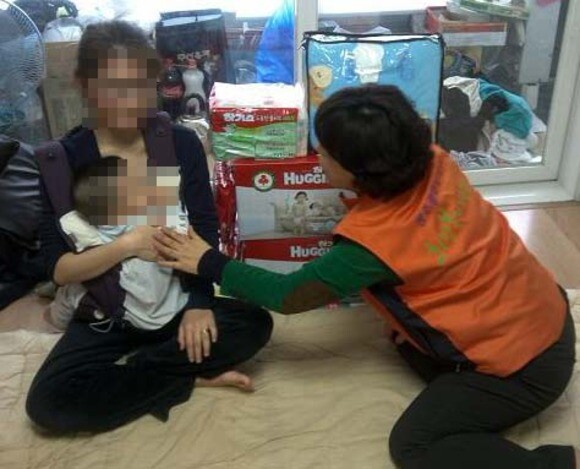hankyoreh
Links to other country sites 다른 나라 사이트 링크
Gwangju city government assisting young, unmarried parents

By Jung Dae-ha, Gwangju correspondent
"K," a 22-year-old resident of Gwangju's West district, ran away from home in her high school days to get away from a violently abusive father. She met a young man around her age, and soon she found herself pregnant. She went to see the young man, who had by then joined the military, and told him about the situation. He said he was in no place to take responsibility for the child.
But K did not want to give the child up. In June 2011, she had the baby as a single mother. Unemployed and on basic livelihood assistance, she struggles to pay for a two-room apartment. At times, she has difficulty controlling her temper with the baby because of the stresses of child-rearing.
Now her district in Gwangju has a program in place to help "little moms" like K who are facing troubles over unintended pregnancies. The West district is the first in her city to provide integrated case management for women in her situation.
The term "little moms" is used in Korea to refer to women who became mothers between the ages of 14 and 24, although there are also "little dads" and "little parents." Members of this group often face economic and emotional difficulties raising children at a young age. This year, the district plans to offer around US$100 worth of baby products such as powdered milk and diapers each month to 20 selected households.
Since no surveys on so-called "little mom families" have been conducted in South Korea, the district's selection process was based on a survey of homes where young parents are raising children while receiving basic benefits and having incomes at the near-poverty level. Support came in the form of 24 million won (US$22,100) offered by the Community Chest of Korea after the district mentioned the need for systematic aid to young parents.
In addition to this program, the district also plans to provide emotional support to young families. Because many young parents in South Korea avoid public activity out of shame, instructors will be visiting families to provide parenting education, with psychological testing also made available as needed in partnership with private organizations.
Yun Sun-ae, a social worker with the director's welfare division, said the program would involve partnering with health management centers and other organizations to visit families and talk about parenting methods.
Because so many young parents are out of contact with their families, the district also has plans for a mother's mentoring project.
"The idea is to introduce the young mother to a volunteer of the right age and personality to serve as a mother figure," explained a district official. "The mentors will be talking to them about child issues and providing them with information about jobs."
Another program in the works involves collecting donations of used toys, strollers, and other baby products from private groups and residents.
Please direct questions or comments to [english@hani.co.kr]

Editorial・opinion
![[Column] Park Geun-hye déjà vu in Yoon Suk-yeol [Column] Park Geun-hye déjà vu in Yoon Suk-yeol](https://flexible.img.hani.co.kr/flexible/normal/500/300/imgdb/original/2024/0424/651713945113788.jpg) [Column] Park Geun-hye déjà vu in Yoon Suk-yeol
[Column] Park Geun-hye déjà vu in Yoon Suk-yeol![[Editorial] New weight of N. Korea’s nuclear threats makes dialogue all the more urgent [Editorial] New weight of N. Korea’s nuclear threats makes dialogue all the more urgent](https://flexible.img.hani.co.kr/flexible/normal/500/300/imgdb/original/2024/0424/7317139454662664.jpg) [Editorial] New weight of N. Korea’s nuclear threats makes dialogue all the more urgent
[Editorial] New weight of N. Korea’s nuclear threats makes dialogue all the more urgent- [Guest essay] The real reason Korea’s new right wants to dub Rhee a founding father
- [Column] ‘Choson’: Is it time we start referring to N. Korea in its own terms?
- [Editorial] Japan’s rewriting of history with Korea has gone too far
- [Column] The president’s questionable capacity for dialogue
- [Column] Are chaebol firms just pizza pies for families to divvy up as they please?
- [Column] Has Korea, too, crossed the Rubicon on China?
- [Correspondent’s column] In Japan’s alliance with US, echoes of its past alliances with UK
- [Editorial] Does Yoon think the Korean public is wrong?
Most viewed articles
- 1‘We must say no’: Seoul defense chief on Korean, USFK involvement in hypothetical Taiwan crisis
- 2N. Korean delegation’s trip to Iran shows how Pyongyang is leveraging ties with Moscow
- 3‘Weddingflation’ breaks the bank for Korean couples-to-be
- 4Will NewJeans end up collateral damage in internal feud at K-pop juggernaut Hybe?
- 546% of cases of violence against women in Korea perpetrated by intimate partner, study finds
- 6[Column] Park Geun-hye déjà vu in Yoon Suk-yeol
- 7“Parental care contracts” increasingly common in South Korea
- 8[Column] Yoon’s first 100 days should open our eyes to pitfalls of presidential system
- 9[Interview] Dear Korean men, It’s OK to admit you’re not always strong
- 10[Editorial] New weight of N. Korea’s nuclear threats makes dialogue all the more urgent